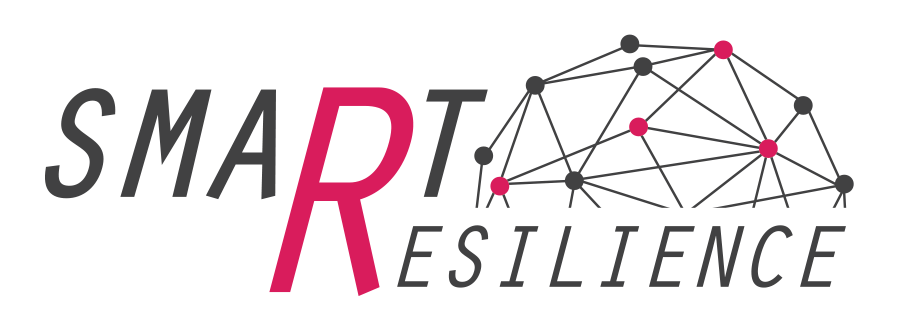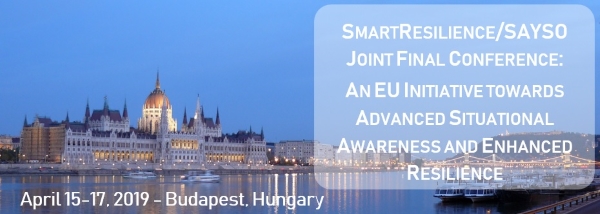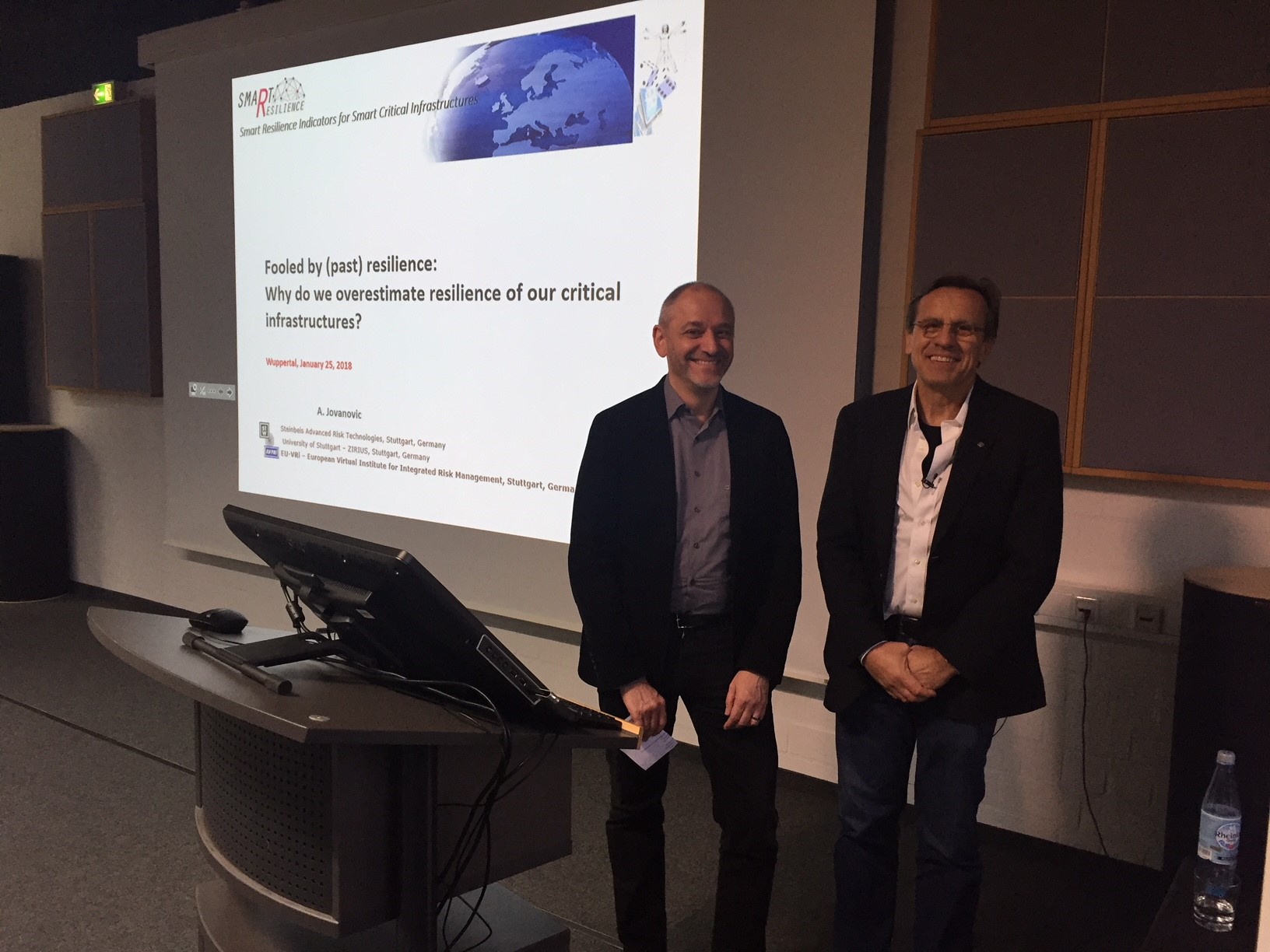|
|
|

|
April 13, 2020 The SmartResilience H2020 project, coordinated by EU-VRi, has finished and its main results are released. more
|

|
May 6, 2019 From Monday, April 15, 2019, through Wednesday, April 17, 2019, the SmartResilience team was pleased to collaborate with fellow EU Horizon 2020 project SAYSO in hosting their projects' Joint Final Conference in Budapest, Hungary, at the Hungarian Academy of Sciences, Institution for Social Sciences. more
|

|
April 4, 2019 Prof. Aleksandar Jovanović will be a featured panelist at the OECD High Level Risk Forum workshop on Good Governance for Critical Infrastructure Resilience and Security, being held on April 5, 2019, in Washington, D.C. (United States). His panel will part of the seminar's Session 3 on "Mapping interdependencies between critical infrastructure sectors and assessing systemic risk." more
|

|
March 5, 2019 The Directorate General for Environment of the European Commission is currently performing an evaluation (aka Fitness Check) of multiple Directives to assess whether the current regulatory framework is "fit for purpose." more
|

|
January 28, 2019 SmartResilience is referenced in a recent update to an International Organization for Standardization (ISO) webpage highlighting the work being done for the new standard ISO 31050 - Guidance for managing emerging risks to enhance resilience. The standard and will provide the guidance needed to deal with the "new, previously unknown or not considered, 'emerging' risks [which] can pose the greatest challenges to resilience, safety and operational and business continuity" and draws upon the work of organizations and projects including SmartResilience. more
|

|
January 7, 2019
The SmartResilience project is highlighted in the recently released Safety Science journal article "Quantitative resilience assessment in emergency response reveals how organizations trade efficiency for redundancy." SmartResilience Project Coordinator Prof. Dr. Aleksandar Jovanović is one of the article's co-authors.
more
|

|
March 8, 2018 The quintessence of the Resilience Assessment Methodology in the SmartResilience project is presented here! more
|

|
Prof. Dr. A. Jovanovic presented the lecture: “Fooled by (past) resilience: Why do we overestimate resilience of our critical infrastructures” at University of Wuppertal (BUW). January 24, 2018 Mr. Jovanovic was invited as guest lecturer for the public safety lecture series at BUW. His presentation focused on the state of the art knowledge about resilience quantification developed within the SmartResilience project. The Horizon 2020 research project is elaborating a new advanced resilience assessment methodology in order to measure and increase resilience of smart critical infrastructures (SCIs) within Europe and around the world. The lecture is available on Youtube (for the BUW channel see Here) and Facebook.
|
ABOUT PROJECT
Challenges
Modern critical infrastructures are becoming increasingly “smarter” (e.g. cities) in normal operation and use: more adaptive, more intelligent…
But:
- Will these smart critical infrastructures (SCIs) be “smartly resilient” when exposed to extreme threats, such as extreme weather disasters or terrorist attacks?
- If making existing infrastructure “smarter” is achieved by making it more complex, would it also make it more vulnerable?
- How is the resilience of an SCI (e.g. as its ability to anticipate, prepare for, adapt and withstand, respond to, and recover) affected when exposed to extreme threats
These are the main questions tackled by SmartResilience.
Objectives
The society needs a system of resilience management going beyond conventional risk management, in order to address the complexities of large integrated systems and the uncertainty of future threats. In modern society the systems that determine resilience of the society are the critical infrastructures (energy grids, transportation, government, water, etc.)
SmartResilience aims to provide an innovative “holistic” methodology for assessing resitience that is based on resilience indicators. SmartResilience specific objectives are:
- to identify existing indicators suitable for assessing resilience of SCIs
- to identify new “smart” resilience indicators (RIs) – including those from Big Data
- to develop advanced resilience assessment methodology and tools
- to test and validate the methodology/tools in 8 case studies, integrated under one virtual, smart‐city‐like, European case study dealing with energy, transportation, health, water infrastructures in smart cities, tackling also cascading effects.
Expected Impacts
SmartResilience will significantly improve the resilience of SCIs by providing a uniform and comprehensive methodology of risk and resilient assessment. This assessment will lead to proactive innovations that eventually will raise the level of resilience at those SCIs.
However, the project will achieve a number of other impacts related to:
- Fostering new product developing and solutions, generating new insights for SCI and their interdependencies
- Providing novel tools and insights for rapid response planning, improved business continuity and organizational adjustments to become more resilient
- Enhancing resilience of the population based on concepts of increased awareness, preparedness, appropriate behavior during disasters.
Who will benefit from this work?
- Researchers and professionals, both from industry and academic world,
- Operators of (smart) CIs who offer their services based on (more) resilient structures,
- Industry and SMEs who offer products or services to the SCI operators that increase their resilience, or solve issues of interdependencies and cascading effects,
- Public sector and community citizens, for better preparedness, information enhancement and awareness.
|
|
|
|
|
|